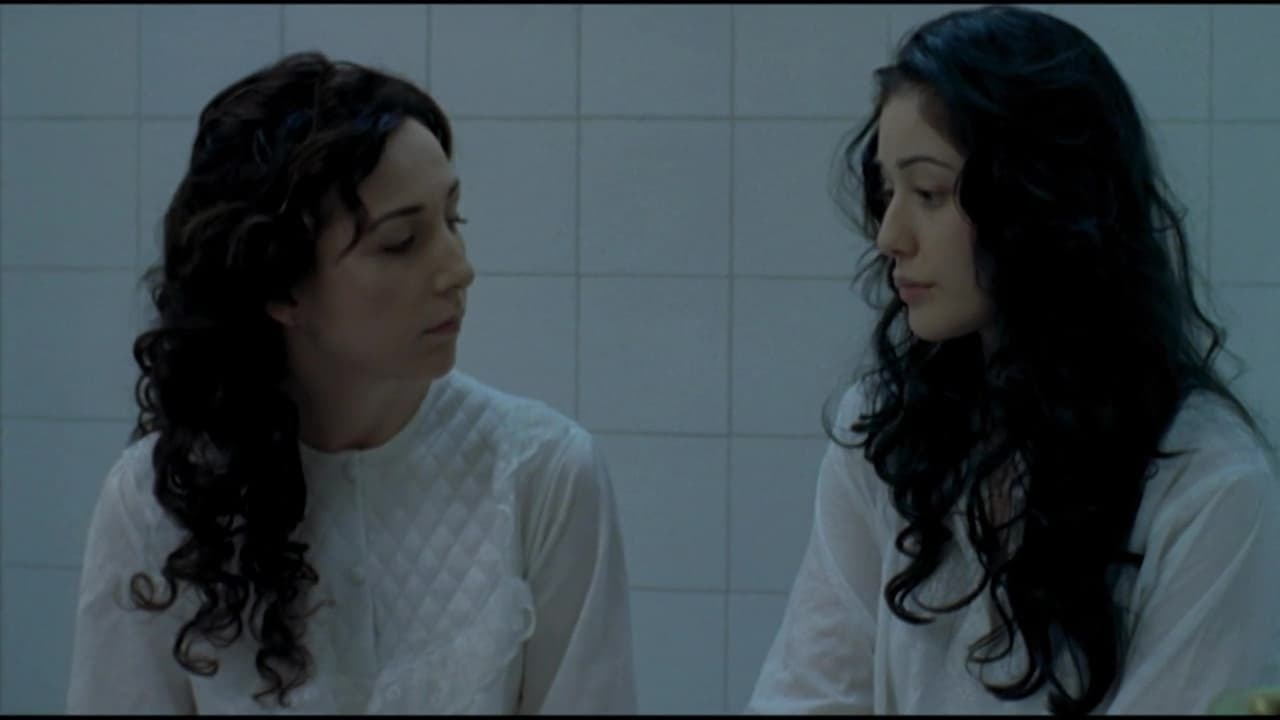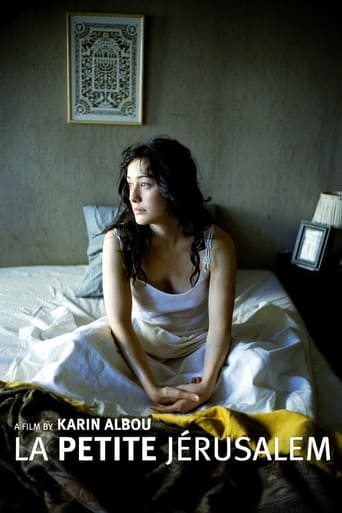



Perfectly adorable
Entertaining from beginning to end, it maintains the spirit of the franchise while establishing it's own seal with a fun cast
View MoreIn truth, there is barely enough story here to make a film.
View MoreThe storyline feels a little thin and moth-eaten in parts but this sequel is plenty of fun.
View MoreA simple story ,beautifully shot and well acted. A girl from an close knit orthodox Jewish family in Paris falls for a mysterious, quiet Arab man. It's familiar territory, but done so sensually, and with such rich sense of detail that it feels completely fresh. A glimpse into a closed off world, where people cling to traditions in both fear and pride, leading to an almost incestuous over-involvement in each other's lives.Great use of close-up image throughout, adding texture, and intimacy, It's that rare film that gives such a strong sense of place, it's almost like you can smell the air of the locations.
View MoreThis little gem, while melodramatic, lingers in memory basically by the beauty of images, music and female characters. You get inside their lives, rites, routine, family life, status of each member, machismo, religion vs. reason, sexuality, taboos one would think would have fallen in the XXI century, urban decay, how little philosophy students earn, even in the first world :) and so many other topics that would be tiresome even to read.The film is fun to watch, it's very easy to relate with the characters, from Todeschini's very believable Ariel (!) to of course Zilberstein, one of the most beautiful faces in French cinema and Fanny Valette, simply startling. Aurore Clément exudes classy intelligence, as in all her roles. In here her role is pivotal, albeit small. "Religion is not opposed to pleasure". Thus, she makes things change for good.Elsa did a classy prostitute with a hidden heart in "Tenue correcte exigée" (1997), thus showing here how big is her actoral range. The only aspect I wasn't very convinced of was Djamel, and his family. For starters, I just don't see him as a good romantic partner for spellbinding Laura. Maybe it's that she's more amenable to our western idea of beauty and success at work. He, on the contrary, seems to do nothing but stalk at her at nigh, like a serial killer. We hear he says he was a journalist, but we get to know nothing about him besides he's got a bigot family. And quite stupidly, he takes her without, seemingly, having asked before if she would be accepted. The Arabs are shown as narrow minded as the Jews, only in a more brutish manner. One of the little phrases that matter is Laura's: "What did you do back home". Everybody was "something else" (presumably, better) before coming to a Paris really off the beaten track us tourists love to watch. François Marthouret, a staple of classic French cinema, portrays a very solid philo teacher. Engaging, intelligent, and fun. You really want to enroll in a College course afterwards! I have to admit Kantism seems a tad rigid, but definitely not so asking ourselves the eternal big questions, justice/law vs liberty, how much can we attain by reason alone, what is our "duty" and so one. By the way, I am surprised a College teacher has to wipe floors and clean schools at night shifts for a living in the first of first worlds. Again, the film doesn't shy away from showing real life. But what sets it apart is the vivid portrayal of the Jewish ritual, both the male's (everybody drinking, toddling their altars, including the kids, and drinking Vodka heavily) and female's Mikva (very interesting, water as purification as usual, but with a twist). The other one I liked was the families gathering on Sunday, banging their feet and emitting shrill voices, just like it must have been in the tribes, 2000 years ago. Enlightening, how so much remains the same while only a few things have changed.Enjoy it, and take care of your loved ones! PS: Another aspect I liked was how both Djamel and Laura suffered when they had to repress their feelings, passions or just lust.
View MoreThis is a terrific film, centered on the life of a family of Tunisian Jewish immigrants in the desolate Paris banlieue of Sarcelle (aka la Petite Jérusalem). We follow two stories : Laura (played by the ravishing Fanny Valette) is a 19 year-old philosophy student, committed to Kant and to rationalism in the midst of a pietistic household which, to put it mildly, does not share her enthusiasm for philosophy (as his pious sister remarks, philosophers take aim at their target and hit the bullseye : problem is, they're aiming at the wrong target). So taken is Laura by Kant that she imitates his daily promenade, every day at the same time...unlike Kant, however, Laura's stroll happens to lead her past the door of the darkly handsome Algerian clandestine immigrant alongside whom she works as a janitor in the evenings. The rest is not hard to predict, but Abdou's direction is always restrained, subtle, understated. There is never a moment in which here characters' words or actions ring false. This is, by the way, one of the best portrayals of philosophy I have ever seen in a film : we often see Laura in her philosophy class, where a Derrida-lookalike prof discourses - rather eloquently - on freedom versus the law in Kant. This stuff actually *matters* to Laura, but the Law she is concerned with is, of course, the law of the Torah. Can freedom be reconciled with obeying the Law? That's Laura's dilemma, and Albou treats it with dignity yet without sententiousness.The other main focus of the film is Laura's older sister Mathilde, played in an award- deserving performance by Elsa Zylberstein. Married with four children, she is deeply pious and sure of herself until she discovers her husband's been fooling around. Her only solace then is the ritual bath, and she seeks sexual advice from its wise attendant in order not to lose her husband. It would have been easy to treat this scene as slapstick, but instead it's done with the greatest respect for the characters involved : Mathilde, who is afraid of losing her modesty and giving way to the dark tendencies of her soul, is astonished to learn that yes, according to the Torah, she is in fact allowed to touch her husband's genitals. Watch also for the lovely scene where Mathilde asks for sexual advice from her mother (the excellent Sonia Tahar). Every dialog rings true, and the superstitious mother, who initially comes across as a domineering harpy, is revealed as a woman of depth and dignity : not because she evolves or "sees the light", but just because we get to know her better.This is a deeply humanist film, set against a background of the utmost contemporary relevance (a synagogue is burned and a group of soccer-playing Jews is attacked by a group of masked thugs ). It's impossible to come away from this film without a deeper understanding of, and therefore respect for, an entire aspect of Sephardic Jewish culture from a feminine point of view
View MoreLa Petite Jérusalem (2005), written and directed by Karin Albou, was shown at the Rochester High Falls Film Festival as "Little Jerusalem." The title refers to the section of suburban Paris that is inhabited by first-generation Jewish immigrants--most of them from North Africa.The Muslim-Hebrew conflict has apparently been transported to France, where each group is suspicious of--and hostile towards--the other.Two Jewish sisters are trapped in conflicts. The older, Mathilde (Elsa Zylberstein), is a wife and mother residing in a modern, developed country, but still living under marital rules and customs brought from her native Tunisia. She realizes that there are problems in her marriage, but doesn't know where to turn for help. Seeking formal therapy would be out of the question. Instead, she receives counseling from the attendant at the mikva--the ritual bath. (This pivotal supporting role is portrayed beautifully by Aurore Clément. Another brilliant supporting actor is Sonia Tahar, who plays the girls' mother.)The part of the younger sister, Laura, is played by Fanny Valette. Laura is a brilliant philosophy student who works at night as a cleaner at a school. She falls in love with a young co-worker from the Muslim community, with predictably problematic results.This film could not be more timely--as I write this review, the immigrant communities in France (primarily Muslim), have risen in revolt against what they perceive as discrimination and prejudice against them within French society. Being an immigrant can never be easy. What makes it so hard is portrayed very well in this movie.La Petite Jérusalem offers a glimpse of a world most of us will never know. The district isn't very attractive, and it's certainly off the beaten path for tourists. The people who live in Petite Jérusalem have to cope as best they can. This film shows how they go about this precarious balancing act. It's a wonderful movie, and is definitely worth seeking out. (In French, Arabic, and Hebrew, with English subtitles.)
View More